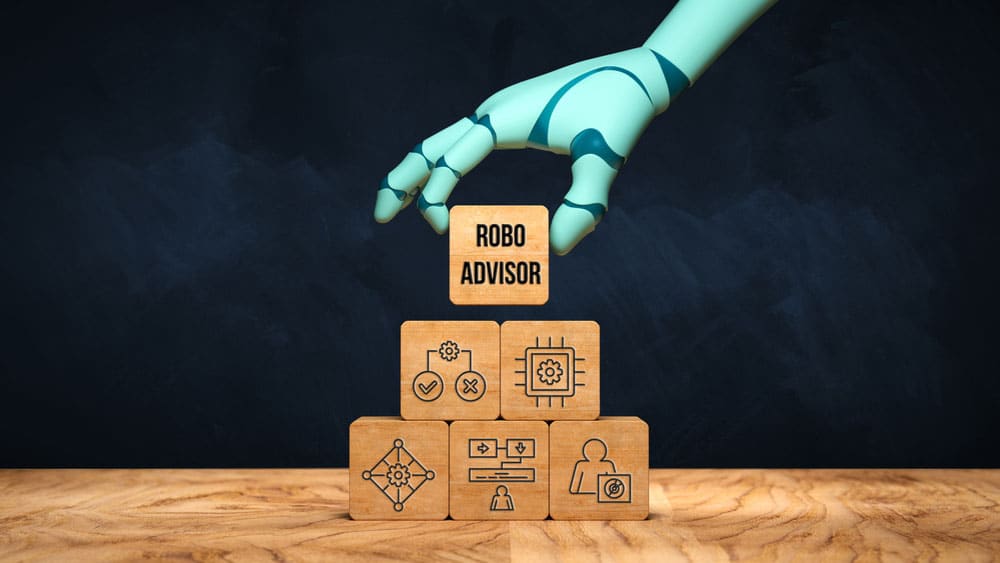5 Facts To Know Before Choosing A Robo-Advisor

Robo-advisors made their first public debut back in 2008 around the same time the very first iPhone was launched in the United States. Now more than 15 years after its inception and with over $700 billion in assets under management, robo-advisors are a fully digital and automated service to both seasoned and novice investors.
Robo-advisors have made investing and portfolio diversification more convenient and accessible as the popularity of digital advisors only helps eliminate complex financial and investing factors. Estimates by a Deloitte report found that by 2025 robo-advisors will have at least $16 trillion assets under management. This would surpass the world’s largest asset management group, BlackRock which currently has around $10 trillion assets under management.
While these digital advisors may seem better than human financial advisors in some cases, many are still relatively skeptical when it comes to the longevity and performance of these digital visors in highly volatile market conditions.
The skepticism surrounding computer-based recommendations had made a clear divide between older and younger investors. A 2019 report by VisualCapitalist found that 67% of millennials saw artificial intelligence (AI) as a basic part of any investment platform, while older investors both Gen Xers and Baby Boomers, were more hesitant to utilize digital and computer-based financial advice.
Robo-advisors have become especially important for those investors who are relatively new to the world of investing who don’t have a lot of wealth or can’t embrace complex financial investment planning strategies.
Traditional and more seasoned professionals value the information gained from meetings with their financial advisors, while more progressive investors tend to enjoy the optimization and automatic portfolio diversification that robo-advisors can provide them with.
As with many things in the hyper-digital world, there are both good and bad qualities to robo-advisors. There are also good and bad qualities when it comes to human advisors as they tend to have a more emotional bias toward their clients and towards market conditions.
Whatever your needs as an investor may be whether it’s investing in precious metals, trading forex and crypto or even setting up a retirement investment fund, robo-advisor platforms come in all shapes and sizes and are all specifically tailored to both seasoned and novice investors.
So if you’re ready to make use of these artificial and digital advisors year 5 facts you need to know before choosing a robo advisor.
AI is the name of the game
While it may seem a bit misleading at first but robo-advisors aren’t robots. These digital platforms make use of artificial intelligence and algorithmic patterns to read and follow market trends.
Furthermore, robo-advisors tend to predict patterns of both high performing and highly volatile market conditions. The use of algorithmic calculations means that robo-advisors can eliminate human and emotional bias. Simply put, these platforms are processing large quantities of information and data at a rapid pace, faster than what humans will ever be able to do.
Based on these processes and data collections robo-advisors can make calculated decisions that will help diversify portfolios and grow investment choices.
It’s all automated
Unlike traditional forms of investing where investors or financial advisers are in charge of investing-related decisions, robo-advisors are fully automated.
This means that after a user has set up their profile and selected from the available stock or commodity options, the digital advisor will then start compiling information and data on possible investment opportunities that are in line with the user’s profile and strategic investment goals.
Although automation helps minimize complex errors and costly mistakes it does however make the investing activities seem less interactive and less human-centered.
Not all robo-advisors are the same
Depending on what you are looking for in a digital advisor each platform or application will present a host of different features, qualities, and investment options.
Some advisors are more suitable for those who look to gain information and experience in the investment industry, while others are more centered around value and growth investment. Some advisors are capable of assisting with portfolio management or portfolio construction.
Larger and more well-established robo-advisors also tend to have better annual returns, minimum investment requirements, or account and portfolio management protocols.
It’s a cheaper option
When looking to invest in the market yourself, or require assistance from a financial advisor, experts suggest that you already have enough capital flow to help support and fund these ventures.
While it’s possible to make some returns from stocks, bonds, commodities and other investment opportunities, you can also lose a lot of money. Despite this high risk, there is also the understanding that investors tend to pay through their teeth for the best possible investment and financial advice from human advisors.
This is what makes robo-advisors a lot more attractive to younger investors who are only now starting to build their investment portfolios and slowly building an investment strategy. What’s also interesting is that with a robo-advisor some may offer you a “dummy” account that can be used as a trial run before heading out into the actual market.
It’s more than investing
While a majority of these platforms operate based on giving people the opportunity to access stock markets and other investment opportunities, these computer-based advisors are also considered a wealth of knowledge and information.
Some advisors will come with additional tools and features to help you build a fundamental understanding, grow your knowledge, and help you learn how markets work. From this, users will be able to formulate their strategies, better understand market trends, and perhaps downscale their need for artificial assistance.
Some experts have suggested that robo-advisors have helped many younger players become more equipped with the right tools and knowledge that could help them both in the near-term and long-term.
Final thoughts
While the topic of robo-advisors may be a two-sided argument, it’s quite interesting to see how far our development in the field of artificial intelligence and financial technology has come in just over a decade.
These platforms are capable of following market trends, predicting possible changes, and mitigating complex and costly challenges. These and other factors make robo-advisors the most suitable and more affordable choice for beginner investors who are looking to learn more about the world of investment and grow their knowledge.
It’s true that robo-advisors are not yet perfect. Perhaps the most intriguing of all is that robo-advisors eliminate the need for human bias and can help process data or information quicker and more accurately than traditional human advisers could ever do. robo-advisors are both a step toward the future and have helped establish a basis for financial technological innovation
Written by Jacob Wolinsky.
Have you read?
The World’s Largest Economies, 2022.
International Financial Centers Ranking, 2022.
These are the countries with the Highest Average Salaries, 2022.
Ranked: The World’s 500 Most Populous Cities, 2022.
Countries and territories with the largest population, 2022.
Add CEOWORLD magazine to your Google News feed.
Follow CEOWORLD magazine headlines on: Google News, LinkedIn, Twitter, and Facebook.
This report/news/ranking/statistics has been prepared only for general guidance on matters of interest and does not constitute professional advice. You should not act upon the information contained in this publication without obtaining specific professional advice. No representation or warranty (express or implied) is given as to the accuracy or completeness of the information contained in this publication, and, to the extent permitted by law, CEOWORLD magazine does not accept or assume any liability, responsibility or duty of care for any consequences of you or anyone else acting, or refraining to act, in reliance on the information contained in this publication or for any decision based on it.
Copyright 2024 The CEOWORLD magazine. All rights reserved. This material (and any extract from it) must not be copied, redistributed or placed on any website, without CEOWORLD magazine' prior written consent. For media queries, please contact: info@ceoworld.biz
SUBSCRIBE NEWSLETTER








